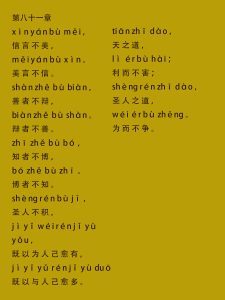Tao Te Ching Chapter 81: The Sage’s Final Teaching

Original Chinese Text
信言不美,美言不信。
善者不辩,辩者不善。
知者不博,博者不知。
圣人不积,既以为人己愈有,
既以与人己愈多。
天之道,利而不害;
圣人之道,为而不争。
Pinyin (Pronunciation)
Xìn yán bù měi, měi yán bù xìn.
Shàn zhě bù biàn, biàn zhě bù shàn.
Zhī zhě bù bó, bó zhě bù zhī.
Shèngrén bù jī, jì yǐ wéi rén jǐ yù yǒu,
Jì yǐ yǔ rén jǐ yù duō.
Tiān zhī dào, lì ér bù hài;
Shèngrén zhī dào, wéi ér bù zhēng.
Structured Translation & Interpretation
Three Paradoxes of Wisdom
| Quality | Authentic Version | Counterfeit Version | Modern Example |
|---|---|---|---|
| Speech | True words aren’t elegant (信言不美) | Elegant words deceive (美言不信) | Scientific reports vs. ad copy |
| Debate | Goodness needs no defense (善者不辩) | Defensiveness reveals lack (辩者不善) | MLK vs. political spin doctors |
| Knowledge | True knowing isn’t broad (知者不博) | Broad knowledge often shallow (博者不知) | Specialists vs. Wikipedia surfers |
The Generosity Algorithm
- Input → Give to others (为人/与人)
- Output → Gain more yourself (愈有/愈多)
- Proof → Nature’s way (利而不害)
Plain English Paraphrase
- The Authenticity Test
- “An honest mechanic’s diagnosis vs. salesman’s pitch” → 信言不美
- “A mother’s plain advice vs. influencer’s platitudes” → 美言不信
- The Generosity Paradox
- “Teachers learn most by teaching” → 既以为人己愈有
- “The more love you give, the more you receive” → 既以与人己愈多
- The Cosmic Model
- “Sunlight benefits all without harm” → 利而不害
- “Sages act without competing” → 为而不争
Key Philosophical Terms
| Chinese | Literal Translation | Psychological Principle |
|---|---|---|
| 不积 | “Not accumulating” | Anti-hoarding mentality |
| 利而不害 | “Benefits without harming” | Sustainable value creation |
| 为而不争 | “Acts without competing” | Flow state achievement |
Modern Applications
For Communication
- “Plain language movements” in legal/medical fields → 信言不美实践
For Education
- “Depth over breadth” (WGU competency model) vs 博者不知陷阱
For Economics
- “Circulatory capitalism” (William McDonough) → 愈给愈多效应
“Like photosynthesis—taking nothing yet giving everything.”
— Biochemical metaphor for 为而不争
Connections to Other Chapters
- Chapter 1: “The named is mother of all things” → Bookends the text
- Chapter 68: “Win without fighting” → Prepares final teaching
Would you like:
- Neuroscience of authentic vs. performative speech?
- Generosity economics research?
- Contrast with “greed is good” philosophy?

3 Comments